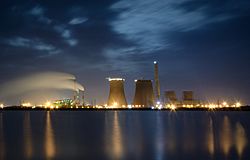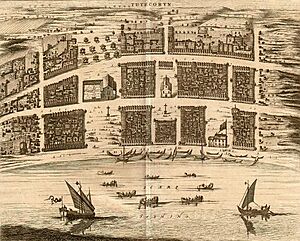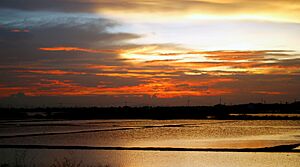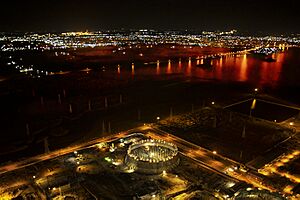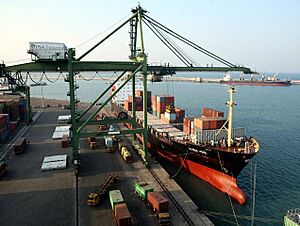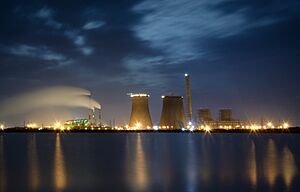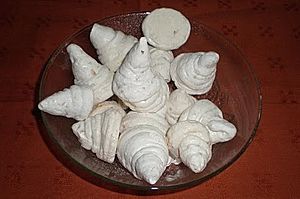Thoothukudi facts for kids
Quick facts for kids
Thoothukudi
Tuticorin (colonial)
|
|
|---|---|
|
City
|
|
|
Clockwise from the top
Thoothukkudi Thermal Power Station, Tuticorin Airport, Pearl Oyster of Pearl City, Our Lady Of Snows Church, Tiruchendur Subramaniya Swamy Temple, Salt Pans in Thoothukudi and V.O. Chidambaranar Port Authority |
|
| Nickname(s):
Pearl City, Salt Capital of Tamil Nadu and Sea Gateway of Tamil Nadu.
|
|
| Country | |
| State | |
| District | Thoothukudi |
| Former name | Tuticorin |
| Region | Pandya Nadu |
| Named for | Macaroon, Parotta, Pearl and Salt |
| Government | |
| • Type | Municipal corporation |
| • Body | Thoothukudi City Municipal Corporation |
| Area | |
| • Metro | 90.663 km2 (35.005 sq mi) |
| Area rank | 8 |
| Elevation | 29 m (95 ft) |
| Population
(2011)
|
|
| • City | 237,830 |
| • Rank | 8th in Tamil Nadu |
| • Metro | 411,628 |
| Demonym(s) | Thoothukudian |
| Languages | |
| • Official | Tamil |
| Time zone | UTC+5:30 (IST) |
| PIN |
628 0xx
|
| Telephone code | +91-461 |
| Vehicle registration | TN-69, TN-92, TN-96 |
| Literacy | 92.10 |
| Climate | BSh (Köppen) |
| Coastline | 40 kilometres (25 mi) |
| Website | |
Thoothukudi, also known as Tuticorin, is a busy port city in the Indian state of Tamil Nadu. It sits on the Coromandel Coast by the Bay of Bengal. Thoothukudi is the main city and headquarters of the Thoothukudi district.
This city is about 590 kilometres (367 miles) southeast of Chennai. It is also 190 kilometres (118 miles) northeast of Thiruvananthapuram. Thoothukudi is known as "Pearl City" because people have fished for pearls here for a very long time. It is also called the "Salt Capital of Tamil Nadu" and the "Sea Gateway of Tamil Nadu."
Thoothukudi is a major seaport in India. Its history goes back to the 6th century CE. Many different groups have ruled the city over time. These include the Pandyas, Medieval Cholas, Portuguese, Dutch, and the British.
The city is managed by the Thoothukudi Municipal Corporation. It covers an area of 353.07 km2 (136.32 sq mi). In 2011, about 237,830 people lived here. Many people in Thoothukudi work in salt pans, shipping, fishing, and tourism.
The 21 islands between Thoothukudi and Rameswaram are very special. They are part of India's first Marine Biosphere Reserve. This area is called the Gulf of Mannar Marine National Park. It is home to about 36,000 types of plants and animals.
Contents
History of Thoothukudi
Thoothukudi has a long and interesting past. It has been known as 'Pearl City' for centuries. It is famous for its pearl fishing and shipbuilding industries.
The old town of Korkai, close to modern Thoothukudi, was a big trading center. People traded pearls here for over 2000 years. Ancient writers like Ptolemy wrote about Korkai's pearl fishing.
Over time, different empires ruled Thoothukudi. The Vijayanagara Empire took control and traded with the Portuguese. Later, the land was given to the British in 1801.
The Portuguese built ports in Thoothukudi in the 1500s. The Dutch took over these ports in the 1600s. In the 1700s, the British gained control of the town. Because it was a port, rulers wanted to improve it for trade. Thoothukudi became a municipality in 1866. Important leaders like Rao Bahadur Cruz Fernandez helped build a modern Thoothukudi.
In 1986, a new district was formed and named after V. O. Chidambaranar. He was a famous leader who fought for India's freedom. Since 1997, the district has been named Thoothukudi, after its main town.
Port Development Over Time
Thoothukudi's main harbor is famous for pearl diving and fishing. It is one of the oldest seaports in the world. It was the main port for the Pandya kingdom after Korkai.
The Portuguese took over the port in 1548. The Dutch captured it in 1658. Then, the British got it in 1825. A lighthouse built in 1842 helped start the port's growth.
Thoothukudi became a city corporation on August 5, 2008. This was 142 years after it became a municipality. The Thoothukudi Corporation now has 60 areas called wards. These wards are grouped into four zones: East, West, North, and South.
The smaller port of Thoothukudi has been busy for over a century. The first wooden dock was built here in 1864. This port was used to send out salt, cotton, and other goods to nearby countries. It also brought in coal and grains. This smaller port handles a lot of goods, over 1 million tons each year.
Geography and Climate of Thoothukudi
Thoothukudi is a port town in the Gulf of Mannar. It is about 125 km (78 mi) north of Kanyakumari. The area around Thoothukudi is mostly flat land near the coast. There are some small rocky hills. The land also has many rain-fed tanks, which are like small lakes.
The soil on the southern side of Thoothukudi is red. It has quartz and fine red dust. The port can be used in all types of weather. The bay, formed by Hare Island and Devils Point, protects ships from strong winds during monsoons. Thoothukudi's beach has calm breezes and very small waves. It looks like a big river.
Thoothukudi is located in South India. It is about 604 kilometres (375 miles) south of Chennai. The city's land is mostly flat. It is divided into two parts by the Buckle Channel. Because it is a coastal area, the soil is mostly clay and sand.
Thoothukudi has a hot semi-arid climate. This means it has very hot summers and warm winters. It gets heavy rain sometimes during the northeast monsoon. Summer lasts from March to June. During this time, the weather is very humid. The highest temperature can reach 39 °C (102 °F). The lowest is around 32 °C (90 °F).
The city gets most of its rain in October and November. It receives about 444 mm (17.5 in) from the northeast monsoon. It gets less rain in summer, winter, and during the southwest monsoon. January is the coolest month. May and June are the hottest. The city has high humidity because it is on the coast.
| Climate data for Thoothukudi (1981–2010, extremes 1955–2012) | |||||||||||||
|---|---|---|---|---|---|---|---|---|---|---|---|---|---|
| Month | Jan | Feb | Mar | Apr | May | Jun | Jul | Aug | Sep | Oct | Nov | Dec | Year |
| Record high °C (°F) | 33.3 (91.9) |
35.8 (96.4) |
34.9 (94.8) |
39.1 (102.4) |
41.1 (106.0) |
40.5 (104.9) |
39.4 (102.9) |
39.3 (102.7) |
38.8 (101.8) |
38.6 (101.5) |
35.3 (95.5) |
33.8 (92.8) |
41.1 (106.0) |
| Mean daily maximum °C (°F) | 29.8 (85.6) |
30.5 (86.9) |
32.1 (89.8) |
33.5 (92.3) |
34.8 (94.6) |
35.8 (96.4) |
35.6 (96.1) |
35.3 (95.5) |
34.2 (93.6) |
32.5 (90.5) |
30.5 (86.9) |
29.7 (85.5) |
32.9 (91.2) |
| Mean daily minimum °C (°F) | 21.5 (70.7) |
22.4 (72.3) |
24.1 (75.4) |
25.5 (77.9) |
26.3 (79.3) |
26.0 (78.8) |
25.7 (78.3) |
25.6 (78.1) |
25.1 (77.2) |
24.1 (75.4) |
23.0 (73.4) |
22.1 (71.8) |
24.3 (75.7) |
| Record low °C (°F) | 15.3 (59.5) |
16.5 (61.7) |
15.6 (60.1) |
19.9 (67.8) |
21.1 (70.0) |
21.3 (70.3) |
20.4 (68.7) |
20.7 (69.3) |
20.0 (68.0) |
17.7 (63.9) |
16.7 (62.1) |
15.6 (60.1) |
15.3 (59.5) |
| Average rainfall mm (inches) | 29.4 (1.16) |
39.6 (1.56) |
24.8 (0.98) |
56.2 (2.21) |
18.3 (0.72) |
3.7 (0.15) |
4.7 (0.19) |
6.2 (0.24) |
14.3 (0.56) |
141.8 (5.58) |
192.8 (7.59) |
99.4 (3.91) |
630.2 (24.81) |
| Average rainy days | 1.6 | 1.8 | 1.9 | 2.7 | 1.2 | 0.4 | 0.4 | 0.5 | 1.1 | 6.5 | 9.2 | 4.8 | 32.1 |
| Average relative humidity (%) (at 17:30 IST) | 76 | 76 | 75 | 77 | 73 | 63 | 63 | 65 | 71 | 76 | 79 | 77 | 73 |
| Source: India Meteorological Department | |||||||||||||
Thoothukudi was ranked 29th best "National Clean Air City" in India for cities with populations under 3 lakhs.
People of Thoothukudi
| Historical population | ||
|---|---|---|
| Year | Pop. | ±% |
| 1961 | 124,230 | — |
| 1971 | 159,506 | +28.4% |
| 1981 | 180,832 | +13.4% |
| 1991 | 199,654 | +10.4% |
| 2001 | 320,270 | +60.4% |
| 2011 | 411,628 | +28.5% |
Sources:
|
||
Thoothukudi was a port town when the Portuguese, Dutch, and British were here. The city grew a lot after 1907. More homes and factories were built, especially between 1907 and 1930.
| Religion in Thoothukudi City (2011) | ||||
|---|---|---|---|---|
| Religion | Percent | |||
| Hindus | 64.97% | |||
| Christians | 30.14% | |||
| Muslims | 4.74% | |||
| Other or not stated | 0.15% | |||
In 2011, Thoothukudi city had 237,830 people. There were 1,010 females for every 1,000 males. This is higher than the national average. The city has a high literacy rate of 92.10%. This means most people can read and write.
About 24,959 people were under six years old. Most people in the city work in different jobs. These include farming, household industries, and other services.
The Thoothukudi urban area had 411,628 people in 2011. About 42,756 of them were under six years old.
Tamil is the main language spoken in the city. Almost 99% of people speak it. The local way of speaking Tamil is called Thoothukudi Tamil. It is similar to Nellai Tamil. English is also spoken by many people.
In Thoothukudi Municipal Corporation, about 65% of people are Hindus. Around 30% are Christians, and 5% are Muslims. In the wider urban area, 71% are Hindus, 25% are Christians, and 4% are Muslims.
Economy of Thoothukudi
Salt production is a very important part of Thoothukudi's economy. The salt pans here make 1.2 million tons of salt every year. This is 90% of the salt made in Tamil Nadu. It is also 50% of the salt needed by the state's chemical industries. S.K.S.C.Nadarajan set up the first factory for iodized salt in South India here.
Other big industries include shipping, fishing, farming, power, and chemicals. Fishing is one of the biggest parts of the local economy. The Thoothukudi Fishing Harbor is one of the oldest and largest in Tamil Nadu.
The Thoothukudi Thermal Power Station has five large generators. There are also several private power plants. Many factories are in the city. These include spinning mills, chemical companies, and food processing units.
Tamilnad Mercantile Bank Limited has its main office in Thoothukudi. It is one of India's fastest-growing private banks. The city also has research centers for marine fisheries and spices.
To handle more trade, the Indian government built a new port. On July 11, 1974, the V.O. Chidambaranar Port Authority became India's tenth major port. It is an artificial port. The government plans to make the port even bigger. This will help more goods be imported and exported.
Thoothukudi is also the end point of the planned Madurai-Thoothukudi Industrial Corridor. This project will bring many new factories and businesses. It is expected to create a lot of jobs.
Fun and Leisure in Thoothukudi
Thoothukudi has an All India Radio Station. It broadcasts in English, Sinhala, and Tamil. There are also FM radio stations like Suryan FM and Hello FM.
The city has the Tharuvai Multi Purpose Stadium for sports. The Thoothukudi Gymkhana Club has modern tennis courts. Thoothukudi is famous for its special bakery item called Macaroon. Unlike European macaroons, Thoothukkudi macaroons use cashew nuts.
There are many religious places to visit. These include the Shankara Rameshwarar Temple and the Our Lady of Snows Basilica. The Basilica is a popular Catholic pilgrimage site. Its festival is celebrated every August. Other festivals include Adi Amavasai and Chittirai chariot festivals at the Shiva temple.
The city has several nice parks for relaxation. These include Bharat Ratna Puratchi Thalaivar M.G.R. Park and Nehruji Beach Park.
Harbor Beach and Muthu Nagar Beach are popular spots. You can visit islands like Hare Island and Nalla Thanni Island. At Muthu Nagar beach, you can enjoy many water sports. These include jet skiing, water scooters, and banana boat rides. There are also places to watch movies in the city.
Getting Around Thoothukudi
<mapframe latitude="8.806161" longitude="78.156009" zoom="11" width="200" height="100" align="right" /> Thoothukudi has a good transport system. It is well-connected to other cities by road, rail, air, and sea. The city has many roads, including concrete and black-topped ones.
There are two main bus stations in the city. About 700 buses run from these stations every day. They go to local places and other cities. The Tamil Nadu State Transport Corporation runs daily bus services. You can also find long-distance buses to cities like Bengaluru and Chennai.
Thoothukudi Railway Station is one of India's oldest and busiest. It has facilities to clean and maintain train coaches. This helps long-distance trains start from Thoothukudi. The railway line between Madurai and Thoothukudi opened in 1874. You can take direct trains to Chennai, Mysore, and other cities. The Pearl City Express is a famous train connecting Thoothukudi with Chennai.
Thoothukudi Airport is about 14 km (9 mi) from the city center. It has flights to Bengaluru and Chennai. The government plans to make the airport bigger. This will allow it to handle more flights and larger planes. Madurai Airport is the closest airport with international flights to Colombo and Dubai.
V.O. Chidambaranar Port Authority is a large artificial deep-sea harbor. It is one of India's major ports. There used to be a luxury ferry service to Colombo, Sri Lanka. This service has started again after many years.
Education and City Services
Thoothukudi city has 31 schools. Ten of these are run by the city government. There are also many high schools and higher secondary schools. Thoothukudi has high rates of people who can read and write.
The city has five colleges for arts and science. There are also three polytechnic colleges. A Fisheries college is located outside the city. There is one government engineering college and many private ones. Thoothukudi also has a Government Medical College and Hospital.
The Tamil Nadu Electricity Board (TNEB) provides electricity to the city. Using plastic polythene bags is not allowed in the city. Thoothukudi is the main office for the TNEB in this region.
The Thoothukudi City Corporation provides water. Water comes from the Tamirabarani River. In 2010–2011, the city supplied 21 million liters of water every day.
About 96 metric tons of waste are collected from the city daily. The city has a system for collecting and managing waste. An underground drainage system was built in 1984. The city also has several health centers and private hospitals.
Bharat Sanchar Nigam Limited (BSNL) provides phone and internet services. Both mobile and broadband internet services are available.
Environmental Concerns
Air pollution is a big challenge for Thoothukudi. Water and noise pollution are also issues. Thoothukudi is listed as a city with unhealthy air by the Ministry of Environment. This is mainly because of high levels of tiny airborne particles called PM10.
Many factories in the city cause pollution. These include coal-fired power plants and chemical industries. Environmental experts say these industries make the air quality worse.
Studies have shown that industrial pollution can cause health problems. These include skin diseases, eye irritation, and breathing issues. Because of these concerns, people in Thoothukudi protested. This led to the closure of a large factory in May 2018.
Research Centers
Thoothukudi has several important research centers. These are run by both the central and state governments.
- Fisheries College and Research Institute (FCRI) is on the Harbour bypass road.
- Thoothukudi Research Centre of The Central Marine Fisheries Research Institute (CMFRI) is on Beach road.
- Suganthi Devadason Marine Research Institute (SDMRI) is also on Beach road.
- An Outreach Centre of CSIR-Central Electrochemical Research Institute (CERI) is in the new harbor area.
- The Sub-Regional office of The Marine Products Export Development Authority (MPEDA) is in Millerpuram.
See also
 In Spanish: Thoothukudi para niños
In Spanish: Thoothukudi para niños
 | Victor J. Glover |
 | Yvonne Cagle |
 | Jeanette Epps |
 | Bernard A. Harris Jr. |


